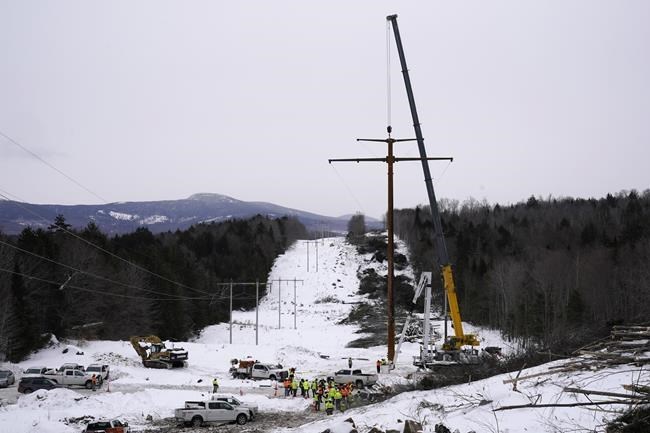
FILE - The first pole of Central Maine Power's controversial hydropower transmission corridor is prepared to be installed on Tuesday, Feb. 9, 2021, near The Forks, Maine. Attorneys will deliver opening statements Monday, April 10, 2023, in a trial that'll determine whether whether a $1 billion electric transmission corridor is built. The power line would bring Canadian hydropower to the New England grid. (AP Photo/Robert F. Bukaty, File)
Republished April 10, 2023 - 6:38 PM
Original Publication Date April 10, 2023 - 1:16 PM
PORTLAND, Maine (AP) — A battle over a $1 billion transmission line that won all regulatory approvals only to be rebuked by state residents in a referendum now comes down to nine regular folks.
In a rare move, a jury is being asked to decide a complicated constitutional matter — whether developers have a vested right to complete the 145-mile (233-kilometer) project, which would supply Canadian hydropower to the New England power grid.
The constitutionality of the statewide referendum on the project depends on the jury’s decision on the narrow vested-rights issue. And the case could turn on a simple majority of jurors.
“We’re not aware of a similar instance in which the fate of a large energy asset rests in the hands of a jury. This is an unusual circumstance,” Timothy Fox, vice president of Clear View Partners, an energy research firm in Washington, D.C., said before the trial began Monday.
The courtroom was packed Monday.
Attorneys for groups opposed to the project and the state attorney general’s office, which is charged with upholding the referendum, suggested to jurors on Monday that developers rushed construction with a goal of winning vested rights and nullifying the referendum.
But John Aromando, the lawyer for the developers, said the construction schedule was put in place years earlier, and that the case is “about fundamental fairness, about vested rights, about protection of property rights against retroactive laws.”
Last year, the Maine Supreme Judicial Court breathed new life into the stalled project when it ruled the retroactive nature of the statewide vote to stop the project would violate the developers’ constitutional rights if substantial construction already had begun in good faith before the referendum. Construction started in January 2021, about 10 months before the referendum in which 59% of voters rejected the project.
Justice Michael A. Duddy could have made the fact-finding determination himself. But he ruled in favor of project opponents, including the Natural Resources Council of Maine, who asked for a jury to make the determination. The judge seated nine jurors and two alternates.
Central Maine Power’s parent company and Hydro Quebec teamed up on New England Clean Energy Connect, which was unveiled in 2017 with a goal of supplying up to 1,200 megawatts of Canadian hydropower to the New England power grid. That is enough electricity for 1 million homes.
It’s one of two proposed large-scale transmission projects aimed at tapping hydropower from Quebec. The other would provide electricity to New York City.
Early on, developers envisioned smooth sailing because the transmission path would mostly follow existing corridors, with only a new 53-mile (85-kilometer) section crossing sparely populated woods to reach the Canadian border.
But the project encountered opposition each step of the way even as it received all necessary regulatory approvals. Developers already had begun cutting trees and setting poles for months when the governor asked for work to be suspended after voters rejected the project in November 2021.
Supporters say bold projects such as this one, funded by ratepayers in Massachusetts, are necessary to battle climate change and introduce additional electricity into a region that is heavily reliant on natural gas, which can cause spikes in energy costs.
Critics say the project’s environmental benefits are overstated — and that it would harm the woodlands in western Maine.
In Maine, two lawsuits over the project went before the Supreme Judicial Court, which ultimately upheld a lease for a 1-mile portion of the proposed power line that crossed state land.
The constitutional issue will likely end up back before the Supreme Judicial Court regardless of the outcome of the judge's decision after the jury trial.
___
This story has been corrected to show the attorney's name is John Aromando, not Armando.
News from © The Associated Press, 2023